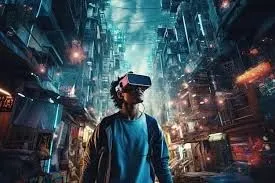Remember how people went crazy when 3D glasses were introduced? It was something like a cinema revolution. Well, this is practically the same, only ten times more advanced. Watching is one thing, but being a part of the experience means something different.
It’s not like the movie industry is the only one doing this. Everyone, from video games to online gambling is utilizing tech innovations to level up their business. Some of the best casinos like Vulkan Bet are already implementing AI and VR to enhance their services.
As time goes on, we’ll see more and more things blended with the latest technology. The best course of action is to understand them, so we can apply them to serve us the best way possible.
How VR Enhances Audience Engagement
The abstract distance between the film and the viewer is called “the fourth wall”. With virtual reality, it gets eliminated. It draws people into the story way deeper than if they were normally watching.
Instead of seeing someone’s emotions on the big screen, the audience can soak them in by being directly in the middle of what’s happening. The environment and characters feel different when you’re a part of their reality, which is no match for traditional ways of move-watching.
Imagine being next to Harry Potter while he’s fighting other wizards, or sitting at the same table playing poker with James Bond. Regardless of the genre you like, virtual reality provides a unique experience that can’t be obtained anywhere else.
Of course, there will be people preferring the old ways, but that’s also fine. For those who seek new adventures and embrace technological changes, this will become an irreplaceable go-to option for enjoying movies.
Challenges in Integrating VR
Just like any other revolution, this one comes with its own set of problems and challenges. Just because it’s opening doors for something amazing doesn’t mean it’s all sunshine and rainbows, especially since it’s still in its early stages.
1. Production Cost
The first roadblock in creating films enhanced with virtual reality is the production cost. The equipment required to make a VR masterpiece will make your average CFO scratch his head. Explaining to the board of directors why you’ve invested tons of money into something — that’s yet to be explored can be difficult.
2. No Path to Follow
With traditional movies, there’s a certain pattern you can follow to reach the desired outcome. There are rules when it comes to pacing, camera angles, scene transitions, and much more. With VR filmmaking, there’s no proven formula. Experimenting is the only way to see what works, but with the high production cost, it’s not something that many directors can do without huge pressure on their shoulders.
3. Audience
Despite being labeled as an advancement, VR comes with some problems. First, wearing a headset for long can be uncomfortable and disorienting for some people. In cases of “VR fatigue”, the entire uniqueness of the experience is missed out on. There are still many of these practical issues that need to be addressed, but those shouldn’t be too much of a challenge if the first two ones are sorted out appropriately.
European VR Film Projects
Since VR is making its big breakthrough in the European film scene, here are some of the most ambitious projects that will bring some cool movies in front of our eyes:
-
The Turning Forest (2016). This bold project is coming from a UK-based director, Oscar Raby. The story follows a young child who roams the magical forest, finding himself against the eyes of a fantastical creature that takes him on an unforgettable journey. The narrative may sound simple, but once VR becomes more widespread, this movie will be remembered as one of the pioneers of this revolutionizing technology.
-
Alice (2017). The famous classic “Alice in Wonderland” was adjusted and remade using VR technology by directors Mathias Chelebourg and Marie Jourden. Based on the all-time classic, the story doesn’t bring so many new narrative points as much as it enhances the visual adventure that’s beyond everything you’ve experienced so far.
The Future of VR Storytelling in the Film Industry
As of right now, the world isn’t crazy about VR and its full range of abilities yet. However, it’s only a matter of time before everyone realizes how powerful and beneficial this new technology is, not just for the movie industry but for many others as well.
The best point about VR movies is that they don’t force you to give up your old habits. Anytime you feel nostalgia and want to go back to see some of the old-time classics, nothing stops you from enjoying the best of both worlds, wherever you want, whenever you want.





 Stefan
Co się dzieje pomiędzy malborskim kołem przewodników, a dyrektorem zamku? Czy to prawda że przewodnicy…
Stefan
Co się dzieje pomiędzy malborskim kołem przewodników, a dyrektorem zamku? Czy to prawda że przewodnicy…
 EWA
Ciekawe co policja z tym zrobi? Ja bym przy okazji sprawdziła zakłady wulkanizacyjne w okolicy
EWA
Ciekawe co policja z tym zrobi? Ja bym przy okazji sprawdziła zakłady wulkanizacyjne w okolicy
 Gregor
Kamerki nie działają niestety a szkoda
Gregor
Kamerki nie działają niestety a szkoda
 RTT
Sz. Panie Prezesie - okazane dobro zawsze wraca .
Wielki szacunek dla Pana .
RTT
Sz. Panie Prezesie - okazane dobro zawsze wraca .
Wielki szacunek dla Pana .
 mistrz
powoli im to idzie
mistrz
powoli im to idzie
 Mieszkanka
Niestety straż miejska ani policja tu nic nie zdziała. Aby mogli założyć blokadę i wystawić mandat…
Mieszkanka
Niestety straż miejska ani policja tu nic nie zdziała. Aby mogli założyć blokadę i wystawić mandat…









































